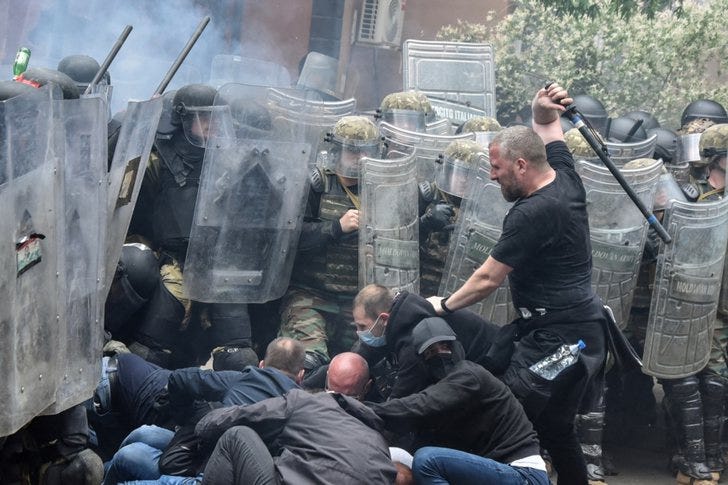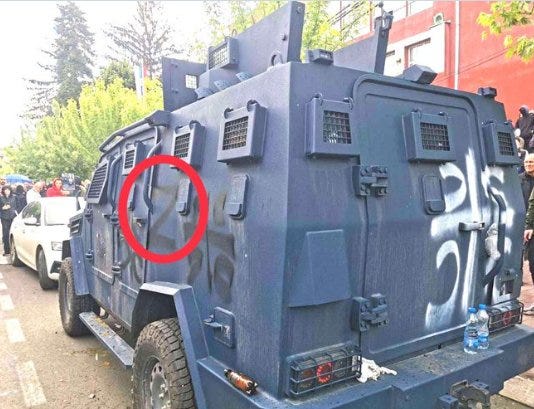Recently, Kosovo has seen some of the worst political violence that the country has known in its short and turbulent history since the end of its war with Serbia in 1999. On May 29th, outraged over the installation of ethnic Kosovo Albanians (Kosovars) as mayors of four Serb-majority towns after the former were elected in a vote that most Serbs boycotted, Kosovo Serbs mobilized for a large demonstration outside of the mayor’s office in the northern town of Zvečan. Hundreds of Serbs chanted and sang “Come out baby,” taunting Kosovar police officers and soldiers serving in the NATO peacekeeping mission (KFOR). Members of a special police division, the Regional Operational Support Unit (ROSU), confronted the demonstrators alongside KFOR troops outfitted in riot gear. The demonstration was arguably raucous, though it remained peaceful until stun grenades and tear gas began to fly into the crowd from behind the phalanx of security forces.
Once crowd control munitions were deployed, the demonstrators briefly dispersed and then regrouped, charging ROSU police and KFOR soldiers. A violent melee ensued, in which security forces were pummeled with rocks, bottles, clubs, and Molotov cocktails. According to an official KFOR statement, 30 peacekeepers were injured in the fray, with many of them having suffered from burns caused by improvised incendiary devices. 11 of those injured were from the Italian NATO contingent, while the remaining 19 were Hungarian soldiers—three of which were reportedly shot by masked Serbs brandishing firearms, though their injuries were not life-threatening. According to Serbian President, Aleksandar Vučić, 52 Serbs were injured, one critically, and four were arrested during the clashes.
The violent demonstrations materialized after NATO forces sealed off administrative buildings in the small northern municipalities of Zvečan, Leposavić, and Zubin Potok on May 26th, hoping to secure them for the incoming mayors. Fighting between ROSU riot police and Serbs broke out then as well, and a police car was torched in Zvečan. Police fired tear gas to disperse the crowds on that day as well.
Scenes from Zvečan on the 29th showed groaning ROSU officers and KFOR troops lying bloodied on the street as their comrades tended to them and loaded them into armored vehicles for medical evacuation. The skirmishes were brutal and were characterized by hand-to-hand combat in the town’s main square. KFOR troops ended up withdrawing and staging support forces in Leposavić to the north of Zvečan and in Mitrovica to the south—typically a hotbed of ethnic tensions, but which remained surprisingly calm during the weekend’s unrest. As KFOR forces withdrew, Serb demonstrators spray painted large Zs on NATO vehicles that were left behind during their retreat—a symbol associated with Vladimir Putin’s “Special Military Operation” in Ukraine—along with the Serbian cross and smiley faces.
As the May 29th clashes were unfolding, President Vučić put the Serbian army on high alert and deployed troops to the border with Kosovo. (This was not the first time he has done so, but previous incidents were arguably less volatile than those over the past days.) NATO has since pledged to commit another 700 troops to the KFOR mission, and on May 30th the US Air Force flew a Rockwell B1-B Lancer over the Bosnian capital of Sarajevo—likely as a regional show of force, but clearly signaling to Bosnian Serb leader, Milorad Dodik, who has expressed separatist ambitions and is becoming increasingly close with Moscow. The majority of the incoming NATO troops will be drawn from Turkey’s 65th Mechanized Infantry Brigade, and on June 5th, the Turkish Ministry of Defense published to social media video of a commando battalion deploying to the country, with troops wearing the KFOR mission patch.
We at Militant Wire spoke with an ambassador of a western Balkan country to get their expert take on the recent spate of violence in Kosovo, and the country’s trajectory. The source told us that in their opinion, Kosovo Serbs in the north of the country are in a somewhat helpless position and many have skeptically thrown their lot in with the Vuĉić administration, despite much of the community suspecting Belgrade of abandonment or outright betrayal of the Serb cause in Kosovo. The ambassador expressed their puzzlement over the lack of Kosovo Serb support for their own politicians in the recent election and added that local ballots in the Serb-majority north are probably their best bet at being fairly represented in the country. The ambassador also remarked on Washington and Brussels’s lack of clear policy in the western Balkans, outside of forcing Pristina into a hurried peace plan, which Kosovo Prime Minister Albin Kurti’s government ultimately accepted, but which was arguably undermined by heavy-handed police actions in the north of the country following the late April elections.
Pristina was sharply criticized by Western allies for their actions in the north, and a working plan for the establishment of a largely autonomous Association of Serb-Majority Municipalities in Kosovo Albanian President, Edi Rama, which was met with strong opposition from prominent Kosovar politicians.






This violent serb insurrection must be stopped
I also wrote about this recently, I suspect Kurti is drastically misplaying his hand:
https://www.thewaywardrabbler.com/p/the-end-of-kosovos-utility